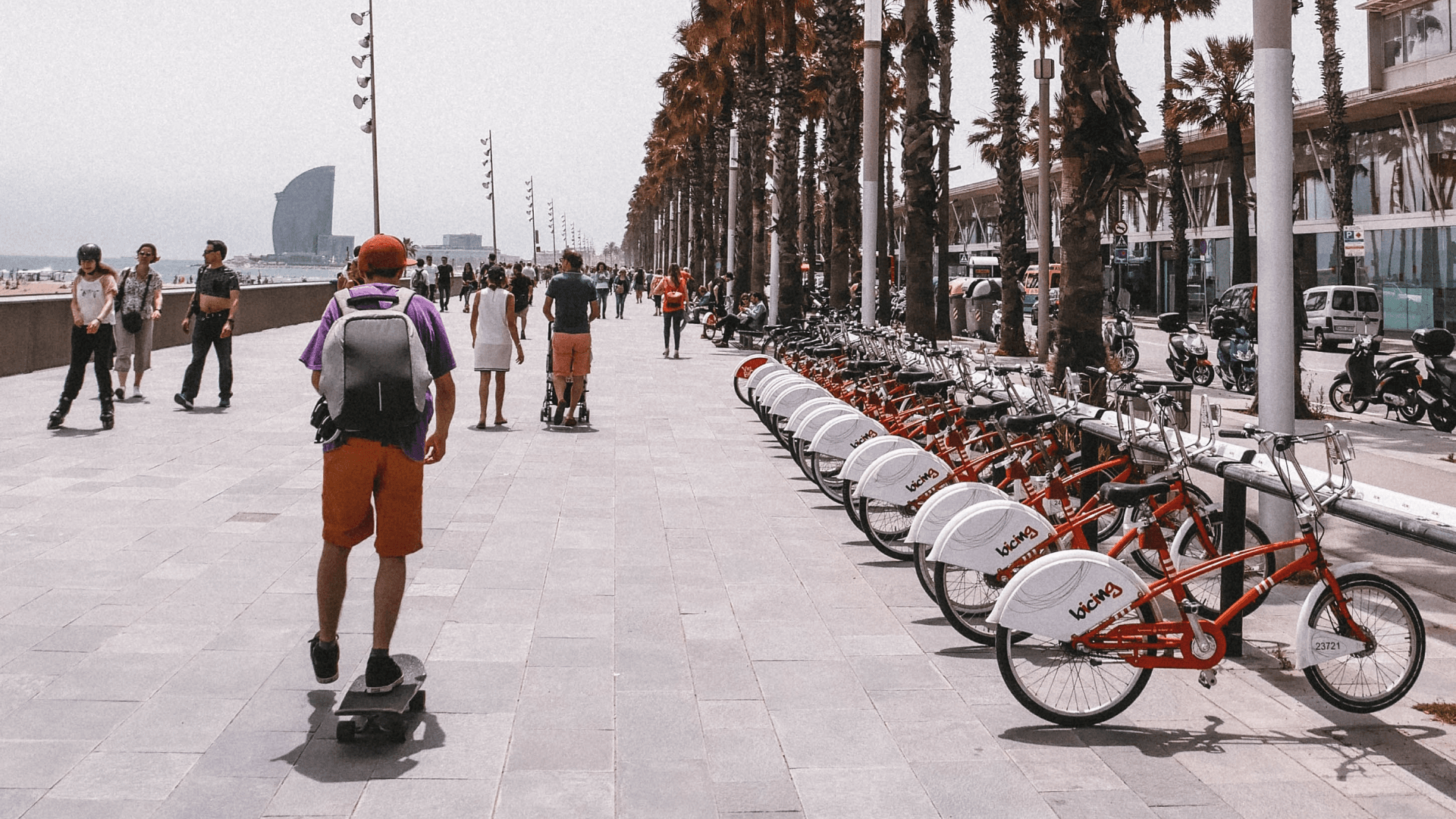Moving to Barcelona: Visa Requirements in Spain - Full Guide
Here is your ultimate roadmap for success when moving to Barcelona, from conquering the student visa process to finding the perfect accommodation and embracing local customs. Your transformative journey starts now!

Copywriter at Harbour.Space University
Here is your ultimate roadmap for success when moving to Barcelona, from conquering the student visa process to finding the perfect accommodation and embracing local customs. Your transformative journey starts now!
Congratulations on your decision to pursue a master's degree in Spain! You're joining a growing trend of American students choosing to study abroad and make that transformative journey to shape their future careers.
We know moving to Spain to obtain a master's degree can be daunting, especially if you’re new to the country. That's why we've created this blog to help you navigate the process every step of the way.
In this blog, we'll cover the next steps to take, from applying for your student visa to the application process to finding accommodation. We'll also provide you with tips on how to make the most of your time in Spain.
We hope this blog will help you make the most of your master's degree in Barcelona, Spain. ¡Bienvenid@!
Step One: Applying for Your Student Visa
The first step after getting accepted to your Master’s programme in Spain is applying for your visa. You can start this process by learning which consulate is in your jurisdiction according to your residence.
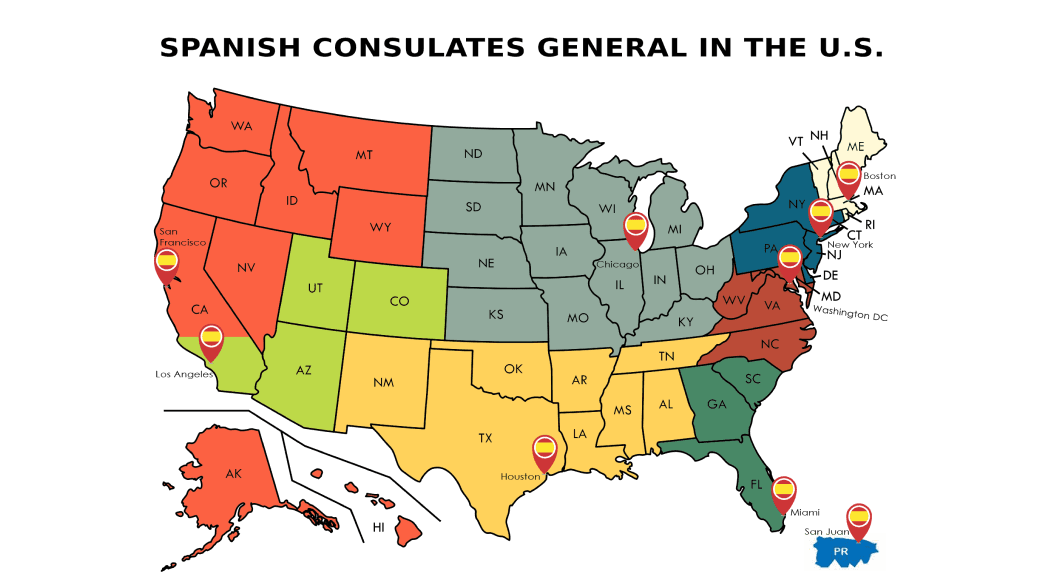
For example, if you reside in Alabama, Arkansas, Louisiana, Mississippi, Tennessee, New Mexico, Oklahoma, or Texas, the consulate in Houston, Texas, will be your destination to apply.
After you know your dedicated consulate, get familiar with the application process required by going to the exteriores.gob.es website and finding yours. While the paperwork we go through below is almost the same for all consulates, some require you to file in person, while others might have you mail in your paperwork. This means travel arrangements might be required; thus, planning in advance is essential.
So, what paperwork is needed, and when do I need to submit it?
Below are the required documents to start your student visa application to Spain which the application must be submitted no earlier than 90 days before the planned travel date.
So, for example, if you’re joining a programme on September 1st, you will need to have your paperwork mailed or an appointment scheduled to file in person no later than June 3rd. However, give yourself about 4 weeks to get the paperwork sorted.
🚨NOTE: Double-check your requirements directly with your Consulate on their website, as there could be slight changes in the process. Think of the below as your helping hand through the process with tips provided by past students.
So let’s get into it.
1. Fill Out Your Visa Application Form
The first thing is filling out and signing the visa application form, which you can download and print here. The form is 5 pages long and will take around 20 minutes to complete depending on how much information you need to search for if you don’t have it in front of you—for example, your passport number or university address.
Make sure to review and even have someone else review, ensuring you didn’t miss a section.
HOT TIP: If your consulate requires you to go in person, print and take an extra copy blank. That way, if they catch a mistake, you have the tools to correct it.
2. Print (2) Passport-Size Photographs
These photographs are used for the *temporary visa (more on that below) you get in your passport. The photo must be in color, taken against a light background, facing forward, without dark or reflective glasses or any garments concealing your face. To complete this, visit any CVS, Walgreens, or local print shop.

HOT TIP: Print 2-3 extra copies and bring them to Spain so you can use them to file for your long-term visa.
*temporary visa explained: Once you get to Spain, you will have 3 months to obtain a TIE (Tarjeta de Identidad de Extranjero) to remain legally in Spain for the duration of your studies. No worries, the process is much shorter and will be explained fully by your university once you arrive in Spain.
3. Have a Valid Passport
A valid passport means it needs to be good for at least the duration of your studies and contain two blank pages. Also, passports issued more than 10 years ago will not be accepted.
Ensure to have the original and photocopies of the biometric data page(s) (aka the important page with your signature and personal information that gets checked at the airport).
4. Proof of Acceptance for the Study
You need an original and photocopy of the document proving your acceptance for your full-time studies. A translation of this statement to Spanish must also be included, but typically your university knows this in advance and will send you this copy when you get your acceptance letter. If not, simply ask the admissions department to provide this.
5. Proof of Financial Means
The Spanish government needs proof that you can financially support yourself and cover the expenses during your stay. To do so, you need to provide the original and copy of documents showcasing you have the minimum required amount.
For example, in 2023, this amount was €700/month, so you must prove you have at least €8,400 in your bank account.
We know this feels like a lot of information, but stay with us. :)
At least ONE of the following documents must be submitted depending on who bares financial responsibility:
- If YOU bear financial responsibility: Submit three most recent monthly bank statements, including your full name and a final balance sheet covering the required minimum funds. The bank statements do not need to be translated into Spanish.
- THE UNIVERSITY: Statement from your university assuming full financial responsibility for room and board (normally included in the acceptance letter). You need to submit an original copy of this statement or letter (electronic copies may be submitted without an original, as long as they include an electronic signature), including an official seal and signature from the issuing institution. Photocopies and online printouts will not be accepted. A translation of this statement to Spanish must also be included if originally in English.
- FINANCIAL AID: Documentation proving the issuing of financial aid, loans, scholarships, or other economic aid that covers the minimum amount required. A translation of this statement to Spanish must also be included if originally in English.
- PARENTS / GUARDIANS: Notarized letter from at least one of your parents or guardians. To make it easy, here is the direct wording you can use from the Spanish Consulate:
“I hereby certify that I, [full name of parent or guardian], [mother, father, legal guardian] of [full name of applicant], assume full financial responsibility for his/her round-trip ticket between Spain and the United States, as well as his/her monthly room and board expenses while he/she is in Spain, and any additional emergency expenses that may arise during his/her stay.”
Plus, you will need to attach all of the following: 1) a notarized copy of the parent or guardian's ID; 2) an original and notarized copy of the student's birth certificate, demonstrating the link; 3) Your parent or guardians three most recent bank statements, showing their full name and final balance that covers the required minimum funds, as well as the cost of student’s students or tuition. The bank statements do not need to be translated into Spanish.
6. Proof of Health Insurance
If you’re under 26, still on your parent's health insurance that covers accidents abroad, and thinking this will work (speaking from experience), this does not. You must have a public or private health insurance entity authorized to operate in Spain, NOT travel insurance.
We recommend Sanitas. It’s the most popular among our students (+ faculty) and not hard to obtain. All you need to do is get a quote for the student plan (starting at €37.35/month), and they will get back to you quickly with a confirmed amount and the next steps. This part of the process usually takes no longer than a week.
HOT TIP: (usually) Your university can provide you a direct contact with a health insurance agent (who also speaks English) to help you through the process. Suppose you’re an upcoming Harbour.Space student, we got you covered! All you need to do is ask the admissions officer to provide this information.
Once you obtain your health insurance, you must submit an original and a copy of the documentation.
7. Criminal Record Check Certificate
Staying for more than 180 days (6 months +)? If yes, you must submit the original and a copy of a background check(s) issued by your country (or countries if you lived outside the U.S.) in the past 5 years. This must be issued by the US Department of Justice – Federal Bureau of Investigation (FBI) within five months before the visa application submission.
On top of that, it must be authenticated with the Apostille of The Hague and translated into Spanish. You must submit a notarized copy of the original document in English and the Spanish translation.
8. Medical Certificate
Again for students staying for more than 180 days (6 months +) in Spain, you will need to provide an original and photocopy of this medical certificate.
All you need to do is make an appointment with your family doctor, explain the situation, and have he/she/them sign off with both their signature and official physician stamp.
This must be issued a maximum of 90 days before submitting the visa application and must be signed by and include the stamp or letterhead of your doctor.
9. Proof of Residence in the Consular District
Consular District is a fancy way of saying where your consulate is located. You can provide one of the following documents: US Driver's license, State ID card, and/or Voter's Registration Card.
10. Payment of the Visa Fee
ONLY a money order is accepted as the payment for your visa fee, which you will need to have by the time of your appointment. Money orders can be made at banks or credit unions, as well as most grocery stores and convenience stores.

Again, this means NO credit cards, debit cards, or personal checks.
The money orders need to be addressed to the "Consulate General of Spain (X)" X meaning your consulate location (i.e., Consulate General of Spain Houston).
The price will vary each year and depend on your consulate. For reference, the price for Houston is $160.
11. Get a Prepaid Envelope
For the consulate to return your documents after approval, you must provide a USPS (and ONLY USPS), Express or Priority Mail, self-address prepaid envelope with tracking numbers.
12. Provide Postal Delivery Authorization
After getting your prepaid envelope, you must fill out a postal delivery authorization, which you can find here. It’s simple! All you do is fill in your name, provide a signature, place/date, and the tracking number of your prepaid USPS envelope - then print and voilà! One of the simplest and last steps in obtaining your student visa to Spain.
A few extra HOT TIPS when applying for your Spain Visa as a student:
- You should not purchase your plane tickets until your visa has been granted
- The Spanish consulate will not accept incomplete applications for processing
- Always provide the original + photocopies of the documents, ensuring no information is cut off the page
Additionally: If you’re a minor (under 18) or traveling with family, please refer to your dedicated Spanish consulate for the required documentation.
Note: The Consular Office could ask you to submit any missing documents or provide additional documents or data necessary to decide the application.
As you’re obtaining your visa, the next step would be to get familiar with Barcelona and search for a place to stay, which we cover in the next part of this article.
Step Two: Arrange Accommodation
Finding housing in Barcelona, Spain, can be exciting but challenging. You might have some competition depending on what you’re looking for and the time of year you arrive (heads up, September is a popular arrival time).
So here are some tips to help you succeed in your search and find what you’re looking for:
1. Research Neighborhoods in Barcelona
Start by familiarizing yourself with the different neighbourhoods. Barcelona comprises 10 districts, each with its own personality and characteristics. When choosing, consider factors like proximity to your university, transportation options, safety, and lifestyle preferences.
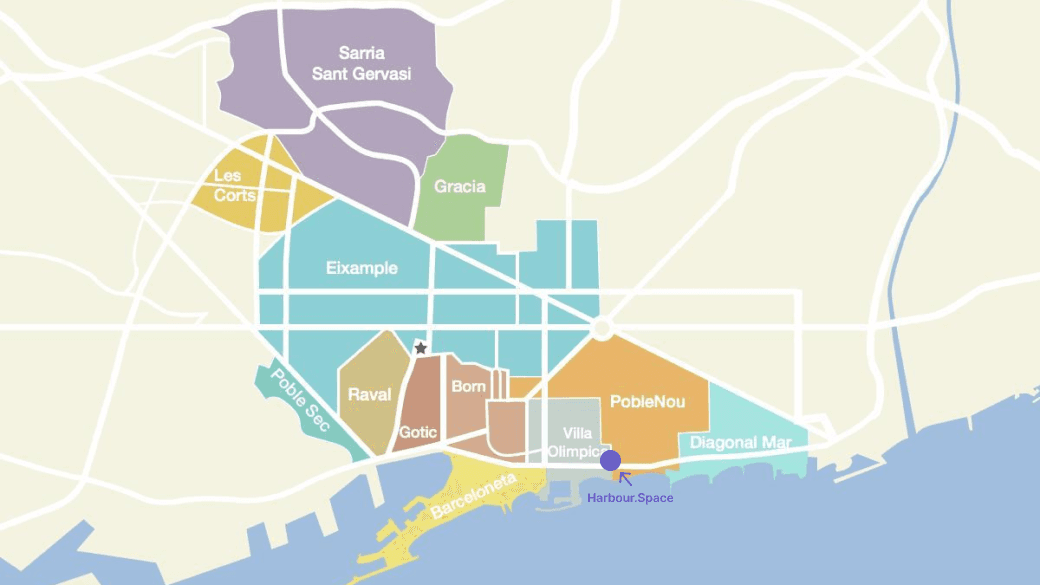
2. Know Your Housing Options
Barcelona offers various housing options, including shared apartments, student residences, and homestays. The best housing option for you will depend on your preferences, budget, and desired level of independence.
If you are on a budget and want to meet new people, a shared apartment is a great option. If you are looking for a safe and secure environment with all the amenities you need, a student residence is a good choice.
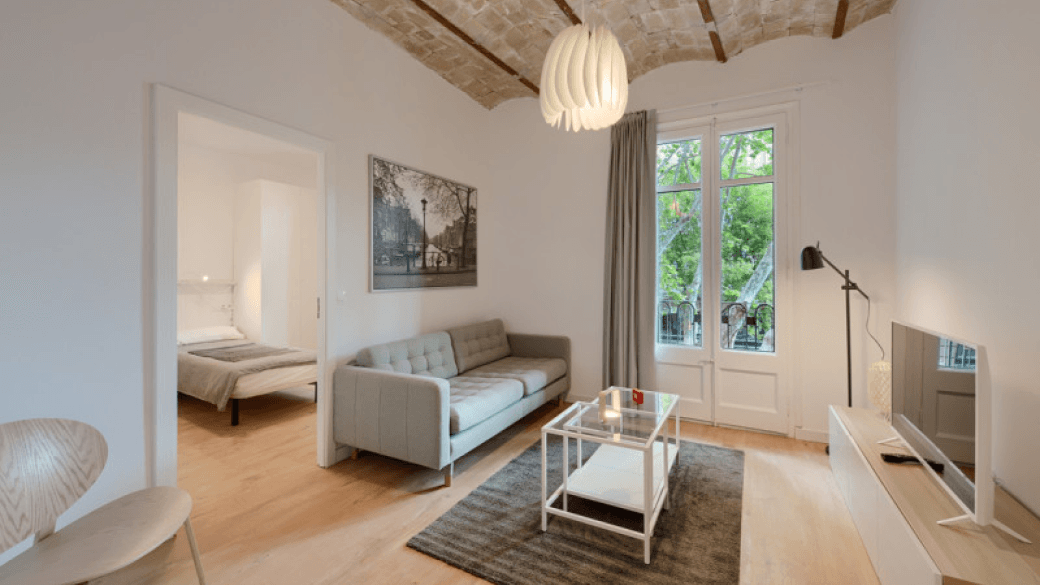
And if you want to experience Spanish culture firsthand, a homestay is the perfect option.
3. Search Using Online Platforms
Utilise online platforms specifically designed for finding accommodation. These platforms allow you to filter your search based on location, price range, and other preferences. Take note of the contact information for properties that catch your attention.
Here’s a list of online platforms that have worked best with prior and current students:
- Idealista
- Spotahome
- Uniplaces
- Badi - Highly Recommended by HS Students
- Habitaclia
You can also join Facebook groups dedicated to housing in Barcelona, such as "Barcelona Housing," "Rooms/Apartments for Rent Barcelona," or "Erasmus Barcelona." These groups often have listings directly from landlords or other students looking for roommates.
Lastly, you can utilize our network! Contact fellow students or those also joining at the same time in Barcelona. They might have a room available or be open to getting a place together.
However, whatever option you choose, be careful with scammers. Barcelona is a popular tourist destination, making it a target for them. Trust your instincts, ask for videos, FaceTime with the landlord in advance, get everything in writing, and, though more expensive, maybe look into using a reputable rental agency.
4. Be Prepared With Documentation
When contacting landlords or potential roommates, be prepared to provide necessary documentation such as proof of enrolment, references, and financial information. Additionally, have a clear idea of your budget and the maximum amount you are willing to spend on rent.
HOT TIP (if visiting an apartment in person): If you like an apartment you found online, and it meets all the requirements upon visiting, come with all the documentation necessary to give to the landlord or agent immediately. You never know if the person after you will do the same and snatch it up before you get the chance.
5. Visit the Housing in Advance
One of the best ways to choose the right housing option in Barcelona is to visit the city in person before your semester starts. This will allow you to assess your housing options' condition, location, and suitability.
Here are some things to keep in mind when visiting potential accommodations in Barcelona:
- Location: Is the accommodation located in a safe and convenient neighbourhood? Is it close to public transportation, shops, and restaurants?
- Condition: Is the accommodation clean and well-maintained? Are there any repairs that need to be made?
- Size: Is the accommodation the right size for you? Do you have enough space for your belongings, and is it comfortable to live in?
- Amenities: Does the accommodation have the amenities you need? Do they have a kitchen, laundry facilities, or a gym?
Once you have visited a few potential accommodations, you can decide which is the best fit for you. Visiting potential accommodations in person is the best way to ensure you are happy with your choice and get the best value for your money.
6. Stay Flexible
Keep in mind that finding the perfect housing may take time. Be flexible and open to different possibilities. Consider temporary accommodations or sublets while continuing your search, as it can be easier to find long-term housing once you are physically present in Barcelona.
Step Three: Learn About the Local Culture
One of the best ways to prepare for a move to Barcelona is to get familiar with the culture, language and events happening throughout your year abroad. This will help you make the most of your time and avoid cultural misunderstandings.

Here are some things you can do to learn about the culture and get familiar with Barcelona:
- Read books and articles: If you haven’t read it, here’s an article about everything you need to know about Barcelona's culture: Living in Barcelona: The City That Has it All for Master's Students
- Talk to people: Talk to your friends, family, or co-workers who have been to Barcelona or who are from Spain. They can share their experiences and give you some extra tips.
- Download Duolingo: This app is a helpful way to learn the basics of Spanish before you arrive. This will help you feel more confident and comfortable, and it will make it easier for them to communicate with locals.
- Sign up for the newsletter, Barcelona Metropolitan: It is the city's number one resource for the international resident community.
Step Four: Pack for Your Year Abroad
Knowing what to pack could be difficult if you’ve never experienced the Mediterranean climate all year round or moved abroad for a long period. So, here is a list of essential items to pack when moving to Barcelona:
Electronics: As a student, you will, of course, need to pack your laptop, phone, camera, and any other electronic devices you will need. Be sure to pack chargers and adapters for your devices, as the electrical outlets in Barcelona (Europe) are different than in most countries.
Documents: Pack copies of your passport, visa, and other important documents. You may also want to pack a translation of your documents into Spanish, as this will be helpful if you need to deal with any official matters in Barcelona.
Other essentials: Medications, portable charger, you can’t live without a water bottle, and a travel pillow.
HOT TIP: There are drinkable water fountains around Barcelona, making it easier for your reusable water bottle to become your new daily accessory.
Clothing: Pack a mix of warm and cool clothing, as the weather in Barcelona can vary depending on the season. Be sure to pack comfortable walking shoes, as you will be doing a lot of walking in Barcelona. To dive in further, here’s what to pack for each season.
Primavera (March to May) / Otoño (September to November): In the spring and autumn, temperatures range from 60°F (15°C) to 70°F (21°C), making it ideal for light layers like jackets, cardigans, and jeans.
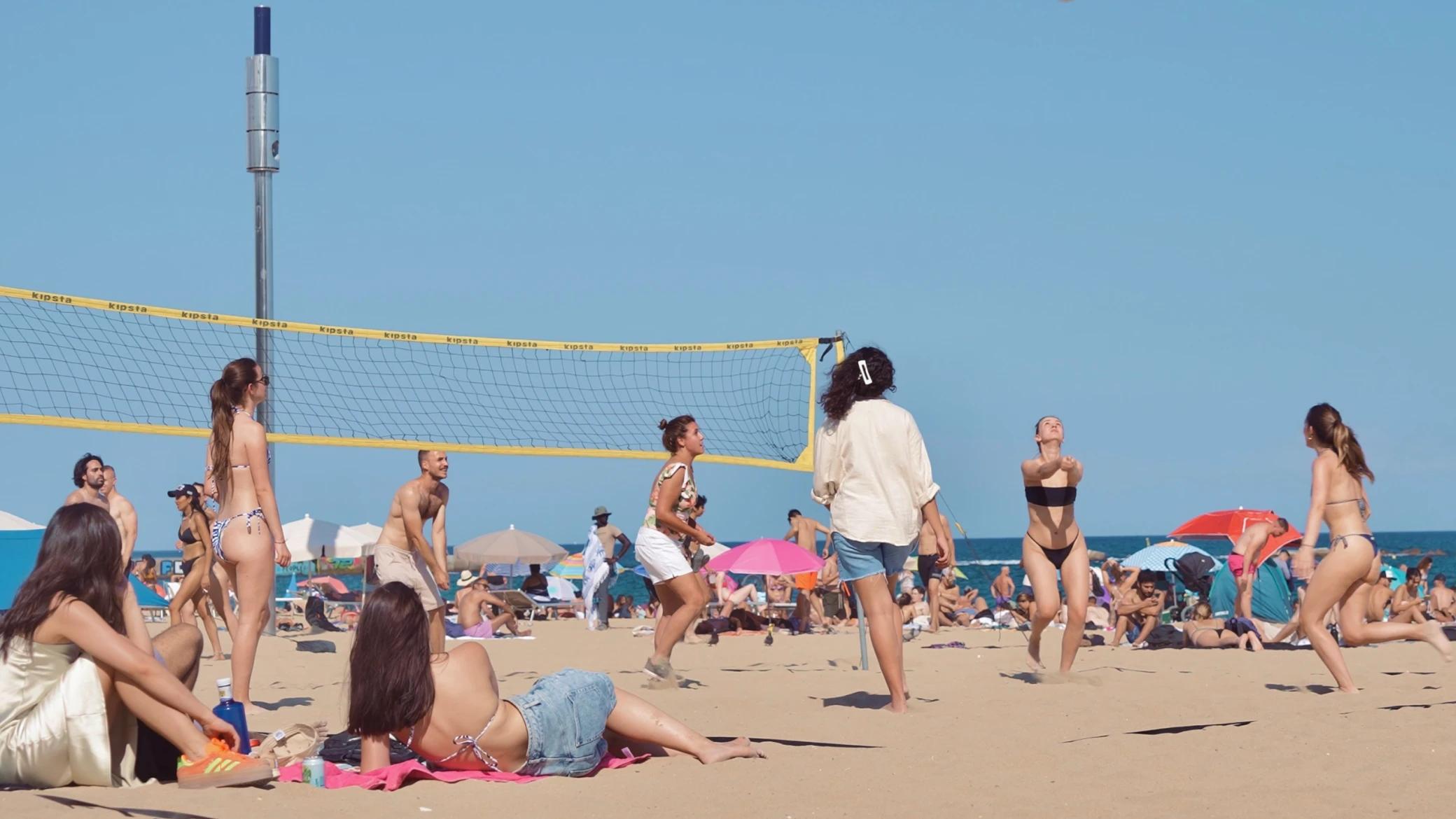
Verano (June to August): Summers are hot, with temperatures averaging around 80°F (27°C) to 90°F (32°C). However, with the humidity, it can feel much hotter. Plus, you must remember that you do a lot of walking in the city and air conditioning is not as common in households or local shops.
So pack lightweight and breathable clothing like shorts, t-shirts, and sundresses, and don't forget your swimsuit to enjoy the beaches.
HOT TIP: Buying a portable fan on Amazon, for example, will greatly help! Plus, make you the most popular of your friends.
Invierno (December to February): Winter brings cooler temperatures around 50°F (10°C), so pack a warm coat, sweater and scarves. If you plan on getting around by bike, gloves are a huge help, especially if you’re commuting longer than 10 minutes.
Also, we recommend one of your pieces of luggage be a carry-on or duffle bag. When you want to travel outside Barcelona, this will make it easier to get around, especially when taking public transportation, as the weight and size of luggage is limited.
Conclusion
Embarking on the journey to pursue your master's degree in Spain is a commendable and transformative decision. This blog has guided you through the intricate process of preparing for this adventure, from applying for your student visa to securing accommodation and understanding the local culture. By breaking down each step and offering practical tips, we've aimed to empower you with the knowledge and confidence to navigate these transitions effectively.
Applying for your student visa requires careful attention to detail, from gathering the necessary documents to following consulate-specific instructions. Remember that preparation is key, as a timely submission is essential for a smooth transition to your academic pursuits in Spain. Your visa journey is a testament to your determination and commitment to your education.
Arranging accommodation in a vibrant city like Barcelona comes with its own set of challenges, but armed with information about neighbourhoods, housing options, and online platforms, you can make an informed choice that aligns with your preferences and budget.
As you immerse yourself in the rich culture of Barcelona, it's wise to acquaint yourself with the local customs, language, and events. This cultural awareness will not only enhance your experience but also facilitate smoother interactions with locals and fellow students.
Lastly, packing for your year abroad requires thoughtful consideration of essential items that cater to the city's varying seasons and your daily needs. Remember that adaptability is key, and equipping yourself with the right clothing, electronics, and documentation ensures you're well-prepared for any situation.
Your pursuit of a master's degree in Barcelona is an exciting chapter filled with growth, learning, and memorable experiences. With the guidance provided in this blog, you are better equipped to embark on this journey with confidence, enthusiasm, and readiness to embrace every opportunity that comes your way.
¡Bienvenid@ a Barcelona, and best of luck on this remarkable educational endeavour!
Thanks for reading
If you’re interested in further growth, take a look at our website to learn what your future could look like at Harbour.Space. Lastly, get in touch with us at hello@harbour.space to let us know your thoughts!
